When addiction is destroying your life or the life of a loved one, professional treatment is often the only hope. Quitting drugs or alcohol on your own generally isn’t advisable because withdrawal can be physically dangerous, and your chances of a sustained recovery are much higher with professional help.
But there are thousands of addiction treatment centers in the world; how do you know which is the right place for you? Some factors will narrow your choices. Your insurance options, out-of-pocket cost, and ability to pay will limit your choices. Also, not all treatment centers will have space for you, as many have long waiting lists.
13 Principles To Ensure Quality Of Care
Once you’ve narrowed down your options and identified a few treatment centers that are accessible to you, it’s time to consider the quality of care. The National Institute on Drug Abuse publishesPrinciples of Effective Drug Addiction Treatment: A Research-Based Guide. It’s recommended that you read and understand this guide before you make any treatment decisions.
Here is an abbreviated version of the guide and its 13 principles:
1. Addiction is a complex but treatable disease that affects brain function and behavior.
2. No single treatment is appropriate for everyone.
3. Treatment needs to be readily available.
4. Effective treatment attends to multiple needs of the individual, not just his or her drug abuse.
5. Remaining in treatment for an adequate period of time is critical.
6. Behavioral therapies – including individual, family, or group counseling – are the most commonly used forms of drug abuse treatment.
7. Medications are an important element of treatment for many patients, especially when combined with counseling and other behavioral therapies.
8. An individual’s treatment and services plan must be assessed continually and modified as necessary to ensure that it meets his or her changing needs.
9. Many drug-addicted individuals also have other mental disorders.
10. Medically assisted detoxification is only the first stage of addiction treatment and by itself does little to change long-term drug abuse.
11. Treatment does not need to be voluntary to be effective.
12. Drug use during treatment must be monitored continuously, as lapses during treatment do occur.
13. Treatment programs should test patients for the presence of HIV/AIDS, hepatitis B and C, tuberculosis and other infectious diseases as well as provide targeted risk-reduction counseling, linking patients to treatment if necessary.
You want to choose an addiction treatment center that believes in the NIDA’s principles. A center’s philosophies regarding addiction treatment should be in line with the Principles of Effective Drug Addiction Treatment, because then you will get the best care with the best chances of guiding you toward a lasting recovery.
5 Questions: Know What To Ask
The NIDA also publishes Seeking Drug Abuse Treatment: Know What to Ask, which suggests five important questions to ask of any addiction treatment center before deciding on it. Here are the recommended questions:
1. Does the program use treatments backed by scientific evidence?
2. Does the program tailor treatments to the needs of each patient?
3. Does the program adapt treatment as the patient’s needs change?
4. Is the duration of treatment sufficient?
5. How do 12-step or similar recovery programs fit into drug addiction treatment?
Choosing Treatment Follow Up
We hope that this description helps you make an informed choice regarding treatment. But if you need more help, please leave your questions or feedback in the comments section below. We do our best to respond to all queries with a personal and prompt response.
By asking the right questions, you’ll be able to determine whether or not a treatment center is the right place for you. Before deciding, you should also try to do some research into the history and reputation of the treatment center you’re considering. Addiction is a life-threatening disease, and it deserves the best treatment you can get.


 RSS Feed
RSS Feed
